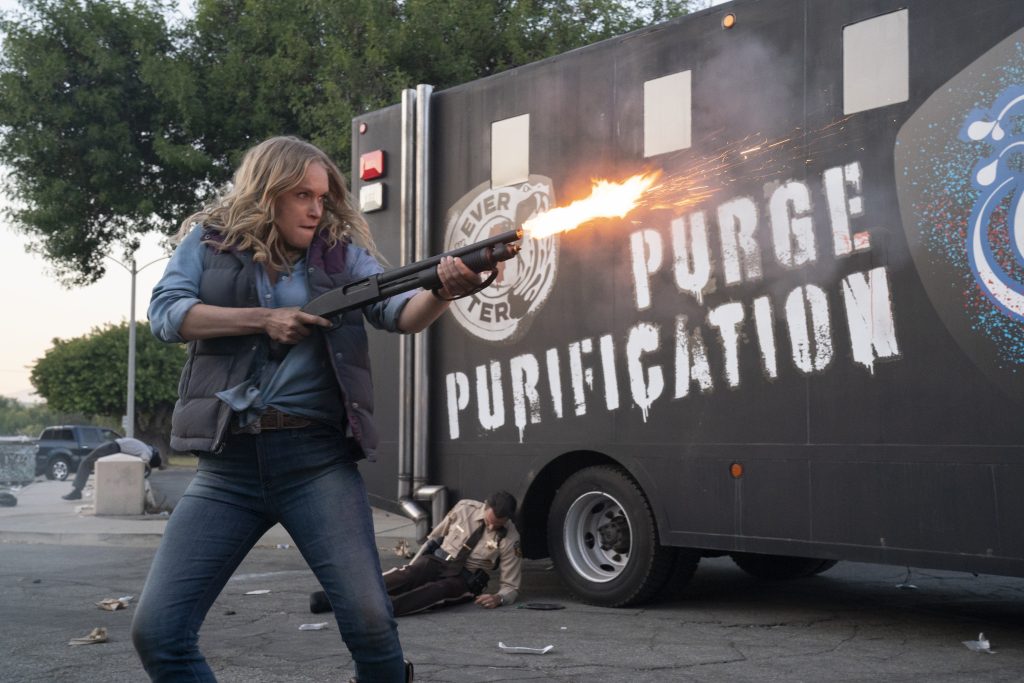June 17, 2023
by Carla Hay

Directed by Gene Stupnitsky
Culture Representation: Taking place in New York state’s Montauk, Long Island, the comedy film “No Hard Feelings” features a predominantly white cast of characters (with a few Latinos and Asians and one Native American) representing the working-class, middle-class and wealthy.
Culture Clash: A 32-year-old Uber driver/restaurant worker is in danger of losing her house due to unpaid tax bills, so she desperately agrees to be paid to take the virginity of a lonely and socially awkward 19-year-old man, who comes from a wealthy family.
Culture Audience: “No Hard Feelings” will appeal primarily to people who are interested in watching cringeworthy sex comedies that have very outdated comedy gimmicks involving older women and younger men.

“No Hard Feelings” is a cringeworthy sex comedy in all the wrong ways. It has few laugh-out-loud moments and mostly recycles crude clichés from 1980s comedies about nerds losing their virginities. Jennifer Lawrence’s full-frontal nude scene reeks of desperation. It’s obvious that Lawrence wants to toss aside her “prestige actress” image for her starring role in “No Hard Feelings” (she’s also one of the producers of this train wreck), but there’s something kind of pathetic about how hard she’s trying to be “edgy,” when this outdated movie is as edgy as a used condom from 1984.
Directed by Gene Stupnitsky (who co-wrote the “No Hard Feelings” screenplay with John Phillips), “No Hard Feelings” has a very “male gaze” to it because it’s a sex comedy where the only full-frontal nudity is from the female gender. Even though there are men in sex scenes too, these men are never shown fully naked in the movie. (Lawrence’s full-frontal nude scene isn’t a sex scene, but it’s a scene that’s meant to be provocative.) It all looks like wish-fulfillment fantasies from sexist filmmakers who want to see women fully naked in their movies but not men fully naked in the same movies.
Everything about this dreck looks like it was written and directed by people who think female empowerment should mean being an obnoxious sex worker who doesn’t want to admit to being a sex worker. Let’s call it what it is: “No Hard Feelings” is about sex work, prostitution, or whatever term you want to use for anyone who has sex in exchange for cash or something of monetary value.
“No Hard Feelings” is being marketed on the concept that a 32-year-old woman named Maddie Barker (played by Lawrence) is desperate for money. And so, she answers an ad placed by two wealthy parents, who are offering a Buick to a young woman who can take the virginity of their reclusive 19-year-old son. The domineering parents have such control over their son’s life, they’ve put a GPS tracker on his phone.
Maddie is a lifelong resident of the beach hamlet Montauk, Long Island, in New York state. It’s an area where many affluent residents of New York City have homes that they often go to for the summer. The year-long residents of Montauk are usually working-class people who are in service jobs where they have to interact with upper-middle-class and wealthy people who are Montauk’s part-time residents. Maddie has a major attitude problem about not being as educated or wealthy as these part-time Montauk residents who can afford to have more than one home.
Later, it’s explained why she has this prejudice: Her biological father is rich, married and a New York City resident who has another home in Montauk. He had an affair with Maddie’s mother, who is now deceased. Maddie was the result of this extramarital affair, and she was raised by her single mother. Her biological father is still alive, he has another family with his wife, and he wants nothing to do with Maddie.
Maddie has two part-time jobs: one as an Uber driver and the other as a restaurant employee at a casual eatery named Charters. She lives in the house that she inherited from her mother. The house was paid for by Maddie’s biological father. Maddie has gotten behind on her real-estate taxes, so there’s a lien on her house, which she’s in danger of losing soon if she doesn’t come up with the money to pay the taxes.
Adding to her financial woes, Maddie hasn’t been making her car payments either. The movie’s opening scene (which is partially shown in the movie’s trailer) has her car being repossessed by a tow-truck driver named Gary (played by Ebon Moss-Bachrach), a sad sack who happens to be Maddie’s most recent ex-boyfriend. Maddie dumped Gary by abruptly cutting off communication with him, and he’s very hurt about it.
Maddie tries to flirt with and charm Gary so he won’t repossess her car. She leads him to believe that she might be interested in getting back together with him. This deception might have worked if Maddie’s latest fling (played by Christian Galvis), a hunky Italian guy, hadn’t come out of the house and made it clear that Maddie has definitely moved on from Gary. None of this is spoiler information, since it’s in the “No Hard Feelings” trailer.
Maddie no longer has the car that she needs to work as an Uber driver. There’s some not-very-amusing scenes of Maddie using roller blades as a means of transportation. It’s just an excuse for the movie to show some slapstick comedy of Maddie trying not to fall down when she goes to certain places on these roller blades. She also tries and fails to steal back her car from Gary—while she’s on roller blades. It all looks so corny and fake.
A frustrated Maddie soon sees an unusual ad that she thinks will be the solution to her financial problems: Two wealthy parents named Laird Becker (played by Matthew Broderick) and Allison Becker (played by Laura Benanti) are looking for a woman in her early-to-mid-20s to “date” their virginal 19-year-old son Percy Becker (played by Andrew Barth Feldman), in exchange for the woman getting a brand new Buick. The parents are worried because Percy is a socially awkward loner, and they want him to be more socially experienced before he enrolls in Princeton University as a freshman student.
This flimsy premise has so many problems. First, losing one’s virginity does not automatically give someone social skills. Second, it would have been a lot easier for Maddie to find a job that pays fast cash instead of going to the trouble of finding another car and then having to wait to get Uber customer requests for low-paying rides. Anyone who knows anything about Uber drivers (and all the non-union employee issues that Uber drivers have) knows that people do not get loads of money from being an Uber driver. Uber drivers also have to pay for their own car expenses, thereby reducing any wages they make as an Uber driver.
Third, who really believes that someone can pay off tax debts large enough for a house lien by being an Uber driver for a few weeks? “No Hard Feelings” expects viewers to believe this nonsense. And let’s not forget that the area where Maddie lives (the New York City metropolitan area) has among of the highest costs of living in the United States. Fourth, although Maddie sneers a few times about how “stupid” Percy is because he’s sheltered and lacking in street smarts, Maddie isn’t very intelligent herself. She wastes a lot of time hoping to get a Buick out of this “dating deal,” when she could’ve spent the time making real money.
But the witless plot of “No Hard Feelings” wouldn’t exist if it actually treated the female protagonist with some respect and had some unique cleverness. Instead, what viewers will see is a lot of Maddie acting entitled and combative to almost everyone she meets, but the filmmakers are trying to make this awfulness look like “female empowerment.” No one is expecting Maddie to be completely likeable, but there’s not much reason for viewers to root for this idiotic character.
And there’s more of Maddie’s stupidity on display. Maddie answers the ad by meeting Laird and Allison in person. Maddie arrives at the Becker house on roller blades. Laird and Allison ask Maddie to come up the high outdoor stairs into the house. Instead of taking off her roller blades, which is what any sensible person would do, Maddie clumsily tries to move up the stairs while on roller blades. It’s a sight gag that’s very stale.
In the meeting with these two creepy parents, it’s made clear that they expect Maddie to take Percy’s virginity, in order for her to get paid by getting the Buick. Maddie agrees to the parents’ demand to keep this deal a secret from Percy. This is sex work, but Maddie denies it by saying to the parents: “I’m not a sex worker.” Yes, Maddie, you are a sex worker, even if it’s just for a one-time deal. Admit it, own it, and move on.
Maddie tells the parents her real age, but she’s able to convince them that she’s a better candidate for the job than women in their early-to-mid-20s, whom Maddie thinks are too emotionally immature. It’s ironic, because Maddie is by far the most emotionally immature person in the movie. Percy is sheltered but he has a much better sense of respect for himself and other people than Maddie has.
And therein lies much of the problem with “No Hard Feelings”: It tries very hard to make Maddie look like a “free spirit” (she’s actually very mean-spirited) who wants to be perceived as a “liberated woman,” but the entire movie is about her actually being at the financial mercy of two wealthy manipulators who have hired her to be a sex worker. Maddie wants to be “tough” (she gets into physical fights with people), but she doesn’t want to be labeled a “sex worker,” because in her mind, being a sex worker makes her a bad person.
This is the mentality of filmmakers who have a madonna/whore complex in how women are portrayed in their movies: The women are either “virtuous” (not shown having sex in the movie) or “sinful” (shown having sex in the movie), with no realistic in-between. It’s a very backwards and misogynistic mindset often found in teenage sex comedies of the 1980s, where the geeky guys are the sympathetic heroes, and the (usually older) women they want to have sex with are hot-tempered and horny seductresses.
The Maddie character is the embodiment of this very tired and over-used stereotype. Expect to hear repetitive and not-very-funny jokes about the age gap between Maddie and Percy. Maddie is constantly mortified that, at 32 years old, she is often perceived as “old” by Percy’s peers. How about this, Maddie? Instead of worrying about being considered “old,” you should be worrying that your life has come down to having sex for a Buick. And let’s not forget that this Buick is not a guarantee that it will help Maddie make enough Uber money to pay off her tax debts.
Of course, “No Hard Feelings” throws in the “abandoned child” storyline to make Maddie look like she needs to be pitied. But make no mistake: “No Hard Feelings” is all about making Percy the real hero of the story. He is the only one who’s presented as having a pure heart. He is lied to and unfairly manipulated by a greedy egomaniac and two very twisted parents, who are let off the hook way too easily in this stagnant and putrid film.
The supporting characters in “No Hard Feelings” are mostly sounding boards for Maddie’s insecurities. Her only two friends are a couple of co-workers at Charters: Jim (played by Scott MacArthur) and his pregnant wife Sara (played by Natalie Morales) are having their own financial problems because they can’t afford their own place and are living with Jim’s parents. Jim and Sara know about Maddie’s “sex for a Buick” deal.
The so-called jokes in “No Hard Feelings” mostly fall flat. Early on in the movie, Maddie mentions that she’s gotten offers to sell her house to wealthy New York City residents, but she doesn’t want to sell her house to them because she’s biased against these types of people. Hasan Minhaj has a quick cameo as a smarmy real-estate agent named Doug Kahn, a former classmate of Maddie’s. The movie’s “joke” about Doug is that when he was an underage teen, he had a sex scandal with a teacher that was similar to the real-life scandal of Mary Kay Letourneau and Vili Fualaau.
After Maddie gets arrested for trying to steal back her repossessed car, she whines to her unnamed lawyer (played by Zahn McClarnon), who happens to be Native American, that she doesn’t want to give up her home to the people who want to take over her land. “Do you have any idea what that feels like?” she asks.
And then, she catches herself when she remembers she’s talking to a Native American, whose people experienced genocide and land stealing from white colonizers. “Of course, you do,” Maddie adds hastily. This lawyer is seen briefly again in one other inconsequential scene, which means he was only in the movie to be a setup for a joke about his Native American heritage.
Percy’s former nanny Jody (played by Kyle Mooney) is a supporting character who is shown briefly in the movie for no other reason but to be the target of homophobic-tinged jokes about gay men. Even though Jody is no longer Percy’s nanny, he’s still very concerned about Percy’s well-being. Because Maddie is relentlessly crass and rude, she has to make a snide comment implying that Jody, as a male nanny, might be involved in pedophilia and might be sexually attracted to Percy.
Percy is an aspiring musician, who spends a lot of time alone practicing on his electronic keyboards and playing video games. He also volunteers at an animal shelter, where Maddie goes to meet an unsuspecting Percy, under the ruse of wanting to adopt a dog. There’s a dour manager at the animal shelter named Crispin (played by Jordan Mendoza), who has some mildly amusing scenes, but Crispin is one of many supporting characters in “No Hard Feelings” that have no depth.
Lawrence has skilled comedic timing in many of her scenes. The problem is that her dialogue and the movie’s scenarios are so horrible or formulaic, it doesn’t matter how good her acting is in the movie (and her acting isn’t that great), it’s all cancelled out by this barrage of mind-numbing and often dull comedy. There’s a really good scene where Maddie and Percy have dinner together at a restaurant, and she pressures him to spontaneously start playing a piano that’s in the room. But that type of scene is few and far in between in this tacky and unimaginative movie that is ultimately a big step down and a total embarrassment for Oscar winner Lawrence.
Columbia Pictures will release “No Hard Feelings” in U.S. cinemas on June 23, 2023. A sneak preview of the movie was held in select U.S. cinemas on June 17, 2023.


